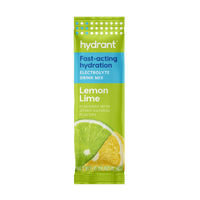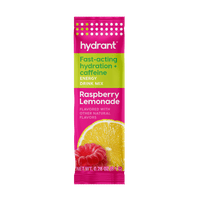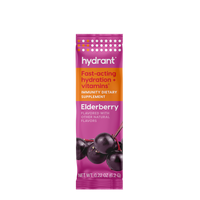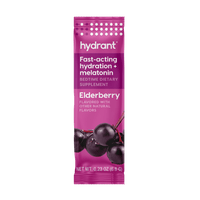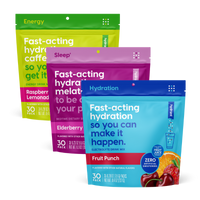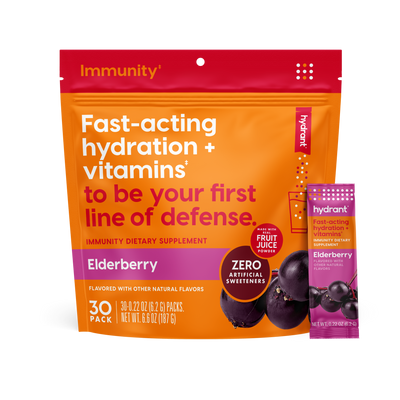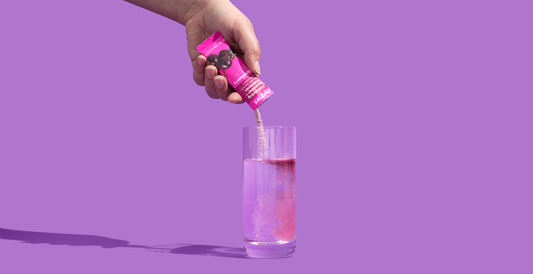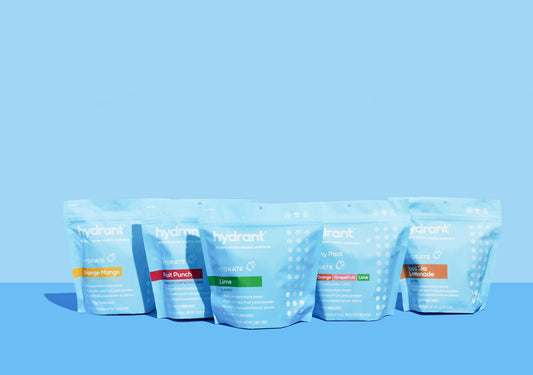There are some things in life that you just know are supposed to be good, but you don’t know exactly why.
Electrolytes are a great example. Lots of people (including us) talk about them. But there’s still a lot of confusion about what electrolytes really are, and what they do. The uncertainty even became a running joke in the movie Idiocracy:
Well, here’s the deal: You really do need electrolytes. Your body requires them to live—even if electrolytes are not, in fact, what plants crave. So...
Exactly What Are Electrolytes?
Electrolytes are minerals you can’t live without, including sodium, potassium, calcium, bicarbonate, magnesium, chloride, and phosphate. [1]
These elements help conduct electrical signals (hence the “electro” in the name) throughout the body, enabling you to walk, run, jump, swim, think, and do everything else you do.
“When dissolved in a solution like water, electrolytes form ions, which carry a positive or negative charge,” says Tori Schmitt, M.S., R.D.N., and founder of YES! Nutrition.[2]
This charge plays a pivotal role in bodily functions, creating a small electrical current that regulates nerve signaling throughout the body, tells your heart to beat, regulates fluid levels in the blood and body, keeps your body’s pH in check, and allows your muscles to contract when and how you need them. [3, 4]
How Do You Get Electrolytes?

You take electrolytes in through your diet. They are naturally present in many foods and beverages. These minerals and salts also get added to sports drinks, hydration beverages, and powders.
Electrolytes in Food
Healthy foods high in electrolytes include...
- bananas
- dairy
- tofu
- seeds
- nuts
- beets
- green, leafy veggies
- avocados (Fun fact: Did you know that avocados contain more potassium than bananas?)
“A balanced eating pattern that offers a variety of foods can help the body get adequate electrolytes,” Schmitt says.
The only problem? Not everyone follows a balanced approach to eating. So people can end up deficient in one (or more) mineral like potassium or magnesium.
Meanwhile, the one electrolyte that most people do get in excess is...sodium, a.k.a. salt. (Surprise, surprise.)
According to the Centers for Disease Control and Prevention, most Americans get roughly 50 percent more sodium than they need—with the majority of sodium intake coming from processed foods. [5]
Sticking to a mostly whole-foods-based diet can help you get the sodium you need without getting more than is healthy for you, Schmitt says. [2]
Electrolytes in Drinks
Several drinks high in electrolytes include…
- coconut water
- milk
- watermelon juice
- fruit juice
- sports drinks
- hydration powders
The levels of each electrolyte will vary between beverages. [6] Also, outside of electrolytes, each of these beverages has different amounts of other nutrients such as protein, antioxidants, and sugar to take into account. (Learn the best way to hydrate for your body.)
What Causes You to Lose Electrolytes?

Your body eliminates electrolytes throughout the day. That’s especially true during exercise or illness.
“Any time there is fluid loss, there is the potential for lowered levels of electrolytes within the body,” Schmitt says. “Remember, electrolytes are minerals dissolved in water, so anytime you’re losing water, you’re losing electrolytes along with it.” [2]
It’s important to replenish these lost electrolytes and fluids to avoid dehydration. (Here are 13 reasons why dehydration is worse—and more prevalent—than you think.)
How Might a Fluid and Electrolyte Imbalance Happen?
The body most commonly loses fluids (and electrolytes) through sweat, like when exercising at high intensities or for long durations, especially in extreme conditions.
Sodium levels, potassium levels, and calcium levels are the most likely to become imbalanced, as the body excretes them in high levels during times of fluid loss.
For example, you know how sometimes your skin feels gritty after a tough workout? That’s sodium on your skin!
Other common causes of electrolyte imbalances include illness, as vomiting, diarrhea and fevers can trigger fluid loss and dry you out, Schmitt says.
In more rare cases, underlying conditions such as kidney disease and kidney failure can interfere with proper hydration and electrolyte levels.
Your body will send you subtle cues that things are getting out of whack, Schmitt says. “It does this by making you feel thirsty, by controlling urine output, and/or by influencing your hormones. This holds true for most athletes who exercise for short bouts of time (like less than a few hours). Generally, food choices can meet electrolyte needs.”
However, if electrolytes are not replaced in sufficient quantities or quickly enough, such as during a long endurance race with not enough rehydration stations, the body won’t be able to operate as well as it should. The effects of this can range from inconveniences such as slow, heavy legs, and fatigue to potentially fatal health complications.
“There is a risk that an electrolyte imbalance could disrupt heart rhythms, cause high blood pressure, deliver muscle contractions, spasms, and seizures, and ultimately threaten life,” Schmitt says. “For example, there is a risk for hyponatremia, a condition of sodium imbalance, in endurance athletes. This serious condition may occur when water is replenished without replacing lost electrolytes and requires medical attention.” [2]
When Should You Supplement with Electrolyte Powders?
Rule #1 is: If you are experiencing the symptoms of an illness, seek the opinion of a qualified medical professional.
While hydration powders such as Hydrant are designed to help replenish lost electrolytes in the correct quantities and balances for optimal health and performance, they are no replacement for proper medical attention.
The times when you exercise—especially if you are exercising in extreme temperatures or for longer than 90 minutes—may merit electrolyte supplementation. [7]
Lastly, if you are experiencing any symptoms of mild dehydration—which can include headaches, fatigue, dizziness and loss of focus—you may also wish to examine your hydration status.
